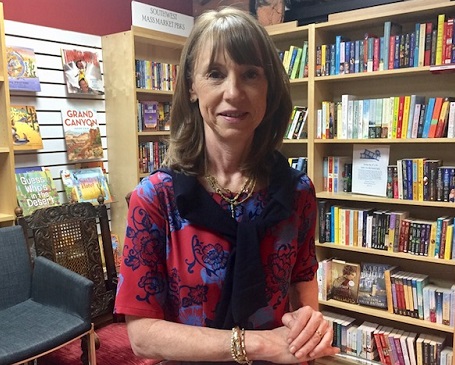
UPDATE: Lisa’s new book The Island of Sea Women is out March 5, 2019. Looks fascinating!
By Patricia Caso/June 6, 2017
Photos provided by Lisa See (@Lisa_See)
TWE’s Stacey Gualandi’s wonderful interview with the New York Times bestselling author, Lisa See, posted in 2011. Since then Lisa has written several more compelling historical fiction books, the latest being The Tea Girl of Hummingbird Lane.
“I feel with every book, I put in everything I ever knew into it. Yet I am still growing and changing from that first book to now. Life changes…even in these last three years, I have learned new things.” Lisa See
This time Lisa, who continues to explore women’s relationships and the concept of mother-love, writes about China’s transnational adoption with a backdrop of the little known Akha people and the tea pickers of an ancient tea, Pu’er. I wanted to find out what more she has uncovered personally and professionally on her themes of women’s friendships and her interest in the dual cultures of China and America…
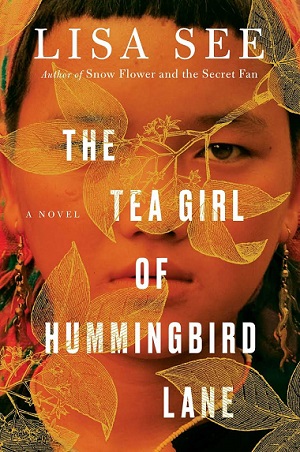 EYE: Your passion is to write about mothers and daughters and that enduring relationship. How has that theme of mother-daughter love changed over the years?
EYE: Your passion is to write about mothers and daughters and that enduring relationship. How has that theme of mother-daughter love changed over the years?
LISA: First of all, every single person on the planet has a mother. Maybe you knew her and maybe you didn’t, maybe you got along and maybe you didn’t, and so on. Maybe you are a party person and she is not. Mothers and daughters are both women, right? So it’s complicated almost always.
In Snow Flower and the Secret Fan, I thought that mother-love was about how a daughter would look at her mother. This was the person binding her feet literally inflicting unbelievable physical pain in the name of love. Love and pain. But we also know that your mom doesn’t have to be binding your feet to torture you; we all know that.
By the time I got to Peony In Love, I had really changed my thinking about mother-love. It really is less about how a daughter looks at her mother than it is about how mothers look at their children. Your fears and worries for your children never change even when they go away, go to college, get married and have kids and have great jobs.
If they get divorced, lose a job or a terrible tragedy happens, even a broken heart, all we can do as mothers is take their pain and carry it in our hearts.
EYE: Do you have a personal connection to this Chinese concept of love and pain?
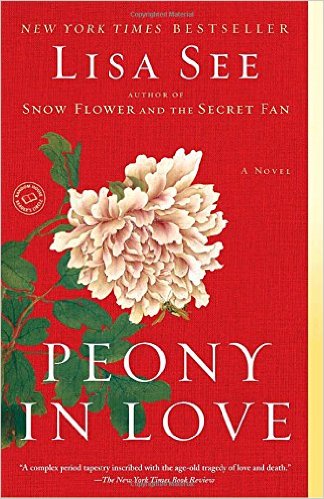 LISA: I was writing The Tea Girl of Hummingbird Lane and twelve days before this book was due, my mom was diagnosed with cancer. She died ten days later. My mom was sick; nobody knew what was wrong but when I look back at it, I can see that this story really is about loss.
LISA: I was writing The Tea Girl of Hummingbird Lane and twelve days before this book was due, my mom was diagnosed with cancer. She died ten days later. My mom was sick; nobody knew what was wrong but when I look back at it, I can see that this story really is about loss.
In this book, it is a kind of loss that has to do with the separation of the mother and daughter. I feel like the mind and heart work in mysterious ways, certainly. But this was part of my evolution in thinking about mother-love. It is a written Chinese character made up of two elements – love and pain. Once again, a daughter loses her mother.
EYE: Did your mom get a chance to read your finished book?
LISA: I read it to her in manuscript, but we didn’t get done.
EYE: Did she like it?
LISA: Carolyn See, my mom, was a writer. She was also a book critic. She reviewed a book a week for the Los Angeles Times for about ten years and then the Washington Post for twenty-five years. I would be reading to her and she would say, “Wait a minute. Wait a minute. Now about five pages back, you said something that really doesn’t make sense now.”
There was one part, one sentence in the book that I really loved. I was really proud of it. When I got to it she said, “You know, I think you should take that sentence out. You’re just showing off.” I did. I crossed it right out.
EYE: Part of your 3-year process of writing The Tea Girl of Hummingbird Lane was researching the Akha people and the ancient Pu’er tea by going to a very remote area of China. What did you find there?
LISA: Going to China was fabulous and I feel very lucky that I get to travel there on research. Parts of the trip were very hard. In the area I was in, they only got electricity 13 years ago. When I was there writing, they’d had it for ten years and it was still kind of iffy.
It’s all dirt roads, nothing paved. So it’s pretty out there. But a trip like that comes with its own set of challenges. I love that part of it. Also, while I was finalizing my research, I met a woman who owns Bana Tea, which sells Pu’er tea. She was going to China during tea picking season and offered that I travel with her. It was perfect.
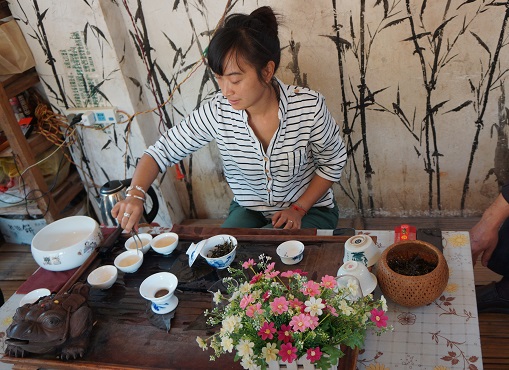
We spent several days with her tea master, which is how I got into the big fermenting warehouses. No white foreigners had ever been in them. The warehouses were surrounded by walls topped with razor wire and armed guards. That was amazing and then to go and visit the different tea growers was amazing. I got to learn every phase of tea processing.
EYE: Were you personally surprised to find anything in your research for the adoption part of the story?
LISA: I would say that my experiences with young adoptees has been life-changing. I actively looked for young women, 18-22 years old, in college or graduates, who had some distance and perspective. I created a list of about a dozen questions, which I sent out around the country.
What I got back were letters 30-50 pages long. These women completely opened their hearts and shared their lives with me. Many of them have grown up in a families where they are the only Chinese face, in the community, school, church, synagogue or family.
It means from the beginning you know you are adopted. They always know that they don’t look like everybody else. They have this kind of conflict of “Well, what am I? Am I Chinese? Am I American? Am I Chinese-American, or am I something else?”
EYE: You have said you have a lot of empathy and sympathy for those emotions?
LISA: Although I lived with my mom growing up, I spent a lot time with my father’s family, which is a really large Chinese-American family. So when I looked around, what I saw were Chinese faces. What I experienced was Chinese culture, Chinese tradition and Chinese food. So that’s the reason I write the kinds of books I write.
The people in my family were my mirror. You see me with them; I don’t look like them, like I belong. In the book there is all that stuff about the “grateful-but-angry adoptee.” I came to think about it differently. It’s less about grateful-but-angry, than it is about grateful-but-sad.
At one point in the book, the character says, ”I know I am the most precious person in my family, but I wasn’t precious enough for my birth parents to keep me as their one child. “ That was so heartbreaking. It’s a double impact. It’s a burden on one hand and on the other there is this void they are carrying.
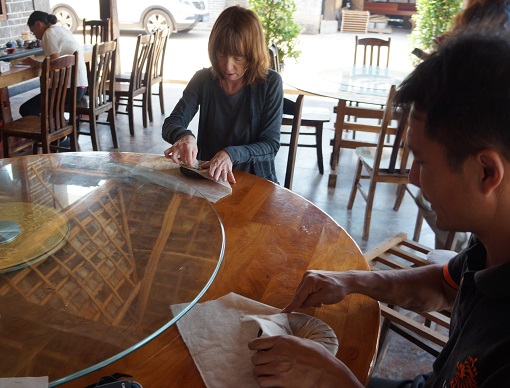
EYE: How do you keep coming up with these ideas for your books?
LISA: With The Tea Girl, I didn’t know I was going to write about tea or the Akha. But, I had actually been thinking about writing about adoption, transnational adoptions in particular, on both sides for twenty years or maybe more. I didn’t know when the moment would be right or how to approach it. I have to let ideas percolate in my head for a long time until it clicks and I think this is how I can tell the story.
EYE: What was the “clicking” point for The Tea Girl of Hummingbird Lane?
LISA: When I was going to the movies with my husband and I saw an older white couple with their Chinese adopted teenage daughter between them. She had a long pony tail, swishing back and forth. I had this vision of her being a fox spirit. In Chinese tradition, fox spirits can be kind of naughty, kind of mischievous, but in their best moments they have the ability to bring great love and to create families.
So when I saw her with that tail swishing away, I thought she really is like a fox spirit. She has brought great love and through her presence she’s created a family. That’s when it clicked, that’s when I really knew this is the one.
EYE: Are you consciously trying to make a difference for women writers?
LISA: I wish I could say that I’m actively trying to promote the idea of women writers. I do hear from a lot of women who tell me that they started writing because of me, or I’ve gotten published because I read that book, etc. I feel so honored by that.
But that’s not something that I can manifest myself; it’s something that is happening outside of me. I actually feel really strongly that it’s important for women to write about their own experiences.
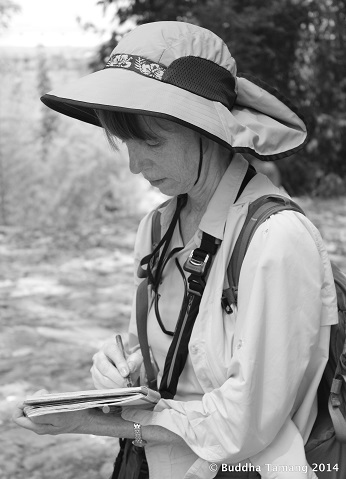
EYE: Why is that important to you?
LISA: I write historical novels. We tend to learn history in terms of wars and dates, the front line of history — presidents, prime ministers, kings, battles and laws, etc. If you take one step off that front line, who is there? It’s women. It’s children; it’s families; it’s the elderly. Really, it’s women.
The point is they have been there – living through history – every step of the way. But their stories and their experiences aren’t told. That’s part of why I write the kinds of stories that I do. Then, just on an emotional level, when I look at the entire canon of Western Literature, it’s been written primarily by men, primarily about men.
It’s a pretty recent phenomenon to have all these women writers. I am motivated to tell stories that are really about women’s relationships in a truthful and authentic way.
EYE: What kind of advice do you have for writers to become a bestselling author like you?
LISA: My ambition was not to be a bestselling author. So, if that’s one’s ambition, maybe that’s not a good one to have, because the odds of that happening are a million to one, maybe even ten million to one. It’s rare when you think of how many books come out each year. So, be passionate in what you are writing, especially if it’s a book.
I really look at it as a marriage, rather than a one-night stand. You’re in it for the long haul. Just like a marriage, there are going to be some serious ups and downs along the way.
You can have a difficult editor; the publisher might fire half the staff; you could get bad reviews; or people might not show up at events. You better really love the act of writing and love what you are writing about because those are the things that will keep you going when and if the bad things happen.
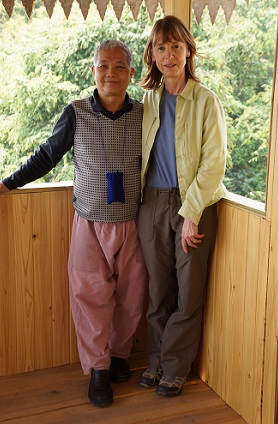
EYE: Can you give us a preview of your next novel?
LISA: YES. There is an island off the tip of South Korea that is a matrifocal society, not a matriarchy. It’s focused on women. For about a thousand years, the women there, known as the haenyeo, were free divers diving down about 60 feet on a single breath and harvest seafood. That’s deep enough to get the bends.
The women would stay underwater for two minutes. Men were at home taking care of the kids, cleaning house and making food. In the 70’s there were about 30,000 divers. Today there are under 4,000 left and most of them are in their 70’s, 80’s and 90’s. They are still diving. Really remarkable! I got to interview many of them and it was just fantastic.
EYE: Can you see personal growth from your writing?
LISA: I feel with every book, I put in everything I ever knew into it. Yet I am still growing and changing from that first book to now. Life changes. My kids grew up, they got married, I am a grandmother now. Even in these last three years, I have learned new things.
I have different kinds of insights into relationships. There’s something to be said that as we grow older, maybe in fact we do grow wiser, or at least have more experiences, or more experiences that tell us about life and how we look at things. That to me is the biggest thing since my first book came out to now. My perception changes – as it did with mother-love. My thoughts have changed and evolved over time; not just with time but with where I am in my life.
EYE: Thank you, Lisa for your generous time while you were on a busy tour schedule. TWE looks forward to more of your insights in your novels for years to come!
###
Lisa’s website–www.lisasee.com
Facebook–/LisaSeeBooks


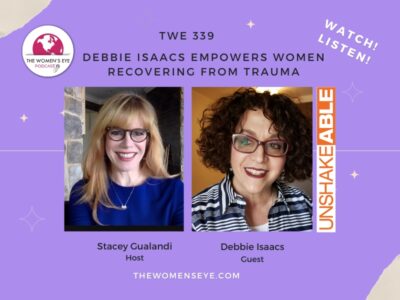
Leave a Reply